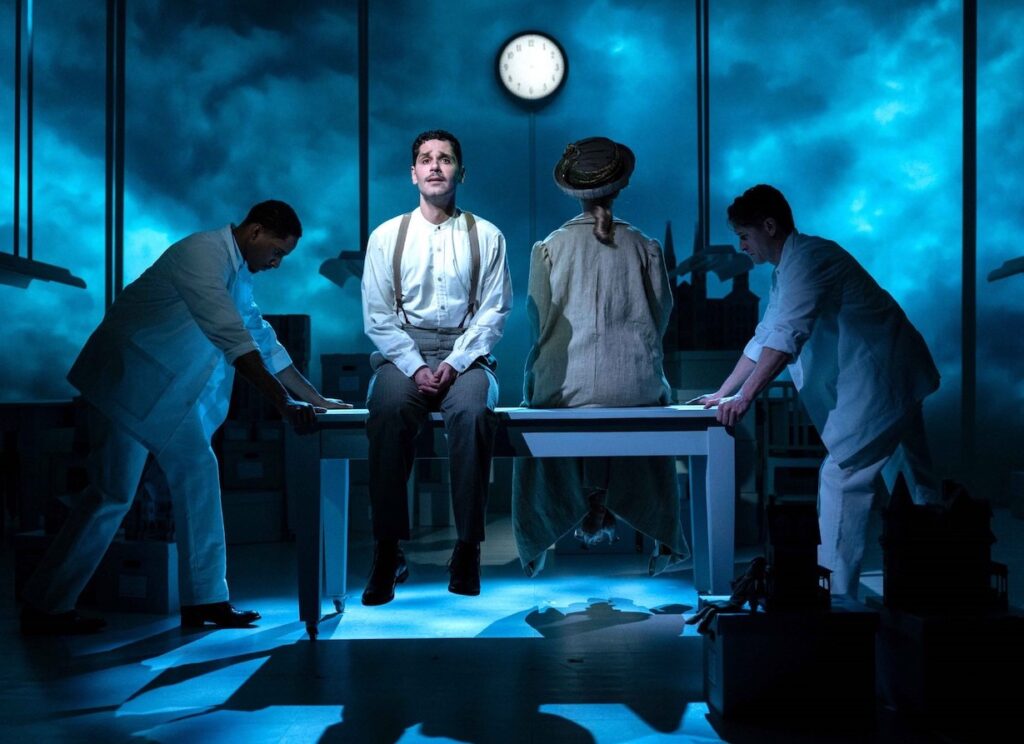Last Chance: ‘Unknown Soldier’ at Arena Stage
By • May 2, 2024 0 179

“As children, we may only know our parents and other relations through the slim lens of their roles in raising and caring for us,” writes Arena Stage Literary Manager Otis Ramsey-Zöe in the program book for “Unknown Soldier.” “Who else are they in the world? Who were they before we came along?”
Closing at Arena Stage this Sunday, “Unknown Soldier” performs sleights of hand with time and space so that the audience can accompany the protagonist Ellen on her quest: to understand, and perhaps empathize with, the grandmother who resentfully raised her.
Like the late Michael Friedman’s earlier musical, “Bloody Bloody Andrew Jackson,” “Unknown Soldier” is an audacious piece of theater, but in a very different way. The book by Daniel Goldstein, who co-wrote the lyrics with Friedman, embeds puzzle after puzzle and twist after twist in this relatively short show (under two hours, no intermission).
To stir the pot — and the plot — still more, because it “takes place in 1918-1920, 1973 and 2003,” there are not only two Ellens, child and adult, but two Lucys, the grandmother and the young woman who married a soldier just before he went off to what became World War I.
At the start, in 1973, we meet school-age Ellen — Riglee Ruth Bryson in a green jumper — who amusingly sings her report about “The Great War.” Her grumpy grandmother Lucy — Judy Kuhn in a lavender robe (hair, wig and makeup designer: J. Jared Janas) — bristles at her questions about a faded clipping. Is she the pretty young woman in the photo? And who is the man in uniform? Scolding her granddaughter, she refuses to answer.
Next to appear, 30 years later, is adult Ellen, played by Lora Lee Gayer. Her grandmother has died and she is cleaning out the Troy, New York, house where she grew up. Encountering the photo again, she is determined to solve the mystery. Where to begin? Cornell University, of course. Librarian Andrew Hoffman, played by Adam Chanler-Berat, replies to her email (from across the stage), initially giving her the brush-off.
Flashback to 1918: Ellen’s future grandmother, now played by Kerstin Anderson, has gone off on an adventure to New York City, where she meets a handsome soldier in Grand Central. They spend the day together, they kiss, they marry — such things happened in wartime — and he ships out.
But he does not return and is presumed dead. When she learns of a shell-shocked, amnesiac soldier, she joins the line of women who have shown up at the hospital ward, believing he may be their lost husband. Called Francis Grand (because he responded to the name Francis and was found wandering in Grand Central), the “unknown soldier” seems to recognize her and vice-versa. She signs in to visit him day after day after day (153 days, to be exact, Andrew reports to Ellen).
This narrative progresses onstage as the pieces come together through the shared research efforts, and long-distance flirtation, of Andrew in Ithaca and Ellen in Troy (a Homeric hint).
Mark Wendland’s set is semi-abstract: an open space with a grid of tables and scattered packing boxes, drained of color, which serves to represent small domestic rooms and — thanks to hanging fluorescent fixtures — large institutional ones; places to picnic and to stroll by moonlight (clocklight, in this case); and — with the addition of tabletop Victorian houses — the historic Hudson River community of Troy, which takes one on the chin as “The Worst Town in New York” (ouch).
Lucy MacKinnon’s inventive back-wall projections help establish these dreamlike locales and Jacob A. Climer’s beautifully detailed (if magically spotless) costumes do much to fix each time period.
Remarkably, this toggling between eras, assisted by evocative songs, feels seamless. For better or worse, the World War I episodes are jarred by two numbers sung and danced (choreography by Patrick McCollum) by Francis’s sympathetic doctor, played by Nehal Joshi, and a foursome from the ensemble yucking it up as newspaper reporters and readers in “Where in the World” and as hospital patients in “The Memory Song.”
Most of the remaining dozen songs, backed by a pit band of six led by Chris Kong, are performed with minimal interaction, almost revue style. This is not a criticism; given the shifting settings, that sparse staging roots the characters, whether dual-portrayed or not, in our minds. And the barriers between periods dissolve entirely in the second-to-last number, “Penelope” (referencing Odysseus’s long-waiting wife), when the two Ellens share the stage with the two Lucys.
While the score recalls that of other contemporary musicals — alternating songs meant to charm with songs expressing strong emotion, often with a pop/rock character — the lyrics, well integrated with the book, are unusually intelligent and witty.
Also directed by Trip Cullman, the New York premiere of “Unknown Soldier” at Playwrights Horizons in 2020 was cut short by the pandemic. Perry Sherman and Kerstin Anderson, both of whom came to Arena from that production, are outstanding as Francis and the young Lucy.
Anderson shines in two of the show’s most heart-wrenching scenes: when in “A Husband Takes Care of the Things” she sets the perfect table for the spouse whose death she refuses to accept (“Breakfast, Johnny!”); and when in “Do You Wonder” she insistently implores the silent Francis to speak her name (“Why won’t you say it? Lucy!”).
In the story’s other pairing, Lora Lee Gayer and Adam Chanler-Berat are credible and winning. The chemistry seems right. One can’t help rooting for Ellen, the wary realist, and Andrew, the overeager romantic, to take the plunge. When he suggests in the quirky duet “Milkshake” that they get one, Ellen responds: “A milkshake is never just a milkshake.”
And in a musical like “Unknown Soldier,” which rewards in unexpected ways, an ending is never just an ending. In fact, it may be a way forward.
“Unknown Soldier” through May 5 at Arena Stage, 1101 Sixth St. SW — arenastage.org.

